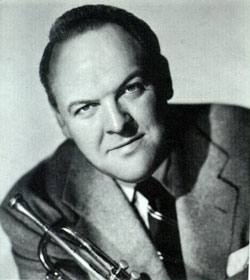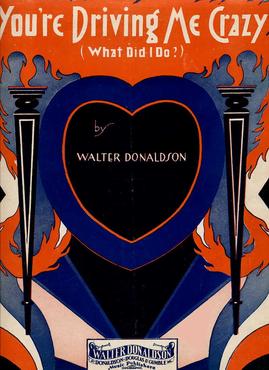
William Clarence Eckstine was an American jazz and pop singer and a bandleader during the swing and bebop eras. He was noted for his rich, almost operatic bass-baritone voice. In 2019, Eckstine was posthumously awarded the Grammy Lifetime Achievement Award "for performers who, during their lifetimes, have made creative contributions of outstanding artistic significance to the field of recording". His recording of "I Apologize" was given the Grammy Hall of Fame Award in 1999. The New York Times described him as an "influential band leader" whose "suave bass-baritone" and "full-throated, sugary approach to popular songs inspired singers such as Earl Coleman, Johnny Hartman, Joe Williams, Arthur Prysock, and Lou Rawls."

Nelson Smock Riddle Jr. was an American arranger, composer, bandleader and orchestrator whose career stretched from the late 1940s to the mid-1980s. He worked with many vocalists at Capitol Records, including Frank Sinatra, Ella Fitzgerald, Nat King Cole, Judy Garland, Dean Martin, Peggy Lee, Johnny Mathis, Rosemary Clooney and Keely Smith. He scored and arranged music for many films and television shows, earning an Academy Award and three Grammy Awards. He found commercial and critical success with a new generation in the 1980s, in a trio of Platinum albums with Linda Ronstadt.

Edward William May Jr. was an American composer, arranger and trumpeter. He composed film and television music for The Green Hornet (1966), The Mod Squad (1968), Batman, and Naked City (1960). He collaborated on films such as Pennies from Heaven (1981), and orchestrated Cocoon, and Cocoon: The Return, among others.
Gordon Hill Jenkins was an American arranger, composer, and pianist who was influential in popular music in the 1940s and 1950s. Jenkins worked with The Andrews Sisters, Johnny Cash, The Weavers, Frank Sinatra, Louis Armstrong, Judy Garland, Nat King Cole, Billie Holiday, Harry Nilsson, Peggy Lee and Ella Fitzgerald.

"Night and Day" is a popular song by Cole Porter that was written for the 1932 musical Gay Divorce. It is perhaps Porter's most popular contribution to the Great American Songbook and has been recorded by dozens of musicians. NPR says "within three months of the show's opening, more than 30 artists had recorded the song."

"One for My Baby (and One More for the Road)" is a song written by Harold Arlen and Johnny Mercer for the movie musical The Sky's the Limit (1943) and first performed in the film by Fred Astaire.
"Without a Song" is a popular song composed by Vincent Youmans with lyrics later added by Billy Rose and Edward Eliscu, published in 1929. It was included in the musical play, Great Day. The play only ran for 36 performances, and also included the songs "More Than You Know" and "Great Day".
"It All Depends on You" is a 1926 popular song with music by Ray Henderson and lyrics by Buddy G. DeSylva and Lew Brown. The song, written for the musical Big Boy, was published in 1926. It was featured in the hit 1928 Warner Bros. film The Singing Fool, starring Al Jolson, Betty Bronson and Josephine Dunn, and directed by Lloyd Bacon.
"This Can't Be Love" is a show tune and a popular song from the 1938 Rodgers and Hart musical The Boys from Syracuse when it was sung by Eddie Albert and Marcy Westcott. The lyrics poke fun at the common depiction of love in popular songs as a host of malignant symptoms, saying, "This can't be love because I feel so well."

"Somebody Loves Me" is a popular song, with music written by George Gershwin, and lyrics by Ballard MacDonald and Buddy DeSylva. The song was published in 1924 and featured in George White's Scandals of 1924.
"I Gotta Right to Sing the Blues" is a popular song with music by Harold Arlen and lyrics by Ted Koehler, published in 1932 for the Broadway show Earl Carroll's Vanities (1932). The song has become a jazz and blues standard. Popular recordings in 1933 and 1934 were those by Cab Calloway, Louis Armstrong and Benny Goodman.
"September in the Rain" is a popular song about nostalgia by Harry Warren and Al Dubin, published in 1937. The song was introduced by James Melton in the film Melody for Two. It has become a standard, having been recorded by many artists since, and featured in a variety of movies, including the 1937 film of the same name.
"The Things We Did Last Summer" is a popular song about nostalgia from 1946. The words were written by Sammy Cahn, with the composition by Jule Styne. The most well known version is the 1946 Top ten hit by Jo Stafford. Versions by Frank Sinatra and by Vaughn Monroe also charted that year. Shelley Fabares had a hit cover in 1962 on the pop chart. Several recordings have been made, including versions by Frank Sinatra, Vaughn Monroe, and Dean Martin who recorded different versions for his 1959 and 1966 Christmas LPs.
"Call Me Irresponsible" is a 1962 song composed by Jimmy Van Heusen with lyrics written by Sammy Cahn which won the Academy Award for Best Original Song in 1963.
"I Wished on the Moon" is a song composed by Ralph Rainger, with lyrics by Dorothy Parker. Bing Crosby sang the song in The Big Broadcast of 1936.

"You’re Driving Me Crazy" is an American popular song composed by Walter Donaldson in 1930 and recorded the same year by Lee Morse, Rudy Vallée & His Connecticut Yankees and Guy Lombardo & His Royal Canadians.
"Baby Won't You Please Come Home" is a blues song written by Charles Warfield and Clarence Williams in 1919. The song's authorship is disputed; Warfield claims that he was the sole composer of the song.
"I Hear a Rhapsody" is a 1941 pop song that became a jazz standard, composed by George Fragos, Jack Baker, and Dick Gasparre. Written in 1940, in 1941 it was a top 10 hit for three separate artists, Charlie Barnet, Jimmy Dorsey and Dinah Shore. “I Hear a Rhapsody” was at the top of "Your Hit Parade" in 1941. It was featured in the 1952 film noir Clash by Night, in which it was sung by Tony Martin. The soundtrack featured jazz notables such as pianist Gerald Wiggins, alto saxophonist Benny Carter, and tenor saxophonist Coleman Hawkins. The film, directed by Fritz Lang, involved a love triangle in a small fishing village and starred Barbara Stanwyck, Robert Ryan, and Paul Douglas.
"I Can't Believe That You're in Love with Me" is a 1926 popular song and jazz standard composed by Jimmy McHugh, with lyrics by Clarence Gaskill.

"This Love of Mine" is a popular American song that was first recorded in 1941 by Tommy Dorsey and His orchestra, with a vocal by Frank Sinatra. Sinatra wrote the words and Sol Parker and Hank Sanicola wrote the music. The recording reached #3 on the Billboard pop singles chart in 1941.







